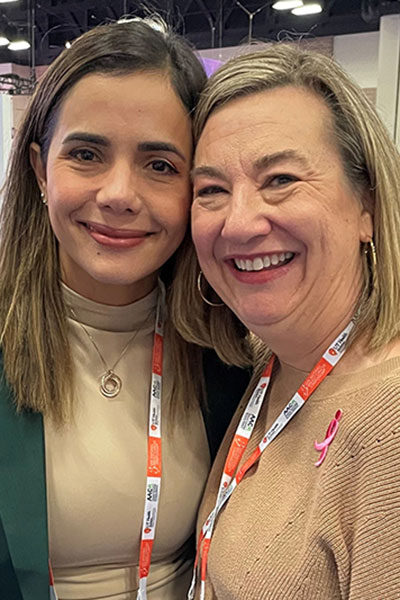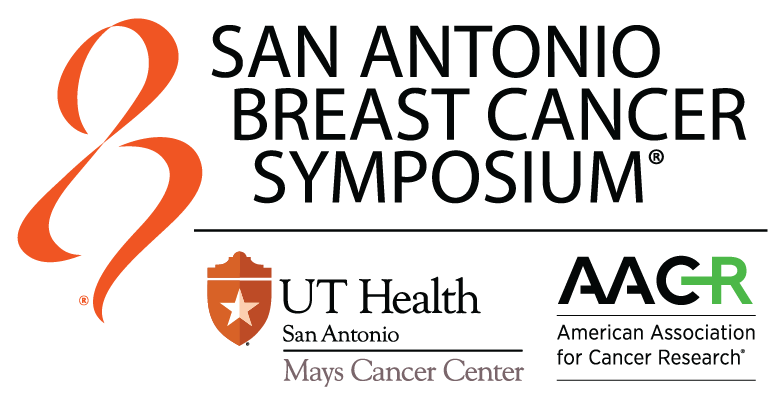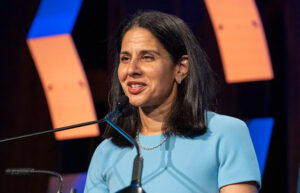A breast cancer diagnosis can be confusing and frightening for newly diagnosed patients. For patients, an essential component to working through the fear and becoming an empowered self-advocate is a strong patient-physician relationship. From preparation before appointments to meeting patients where they are in their lives, breast cancer care providers must build trust with their patients, which opens the door to more open and honest two-way communication.

Marcela Mazo Canola, MD, a medical oncologist specializing in breast cancer at the Mays Cancer Center at UT Health San Antonio, shared her expert insights on best practices for creating trust in a relationship and on helping to empower patients in their care. Dr. Mazo Canola’s patient, Laurel Pointer, who is also the Director of Community Marketing for Susan G. Komen, provided valuable insights regarding the importance of brave communication and how the right resources can be crucial to better care outcomes.
More from this conversation will be published in December during the San Antonio Breast Cancer Symposium®. Dr. Mazo Canola and Pointer will offer tips for how patients can make their goals known to providers. They will also discuss the importance of expectation setting for patients regarding treatment-related side effects and the value of clinical trial research for current and future patients.
What are some best practices for building trust in the patient-physician relationship?
Dr. Mazo Canola: When I get a new patient, the first thing I do is make sure that all of the necessary testing has been done. That way I have all of the information I need to meet a patient and form a potential plan. I also usually check ahead of time to make sure that any surgical appointments have been made and, if not, I just put the orders for those through so the patient is ready to take the next step in their care immediately after talking with me. I walk into the patient room with a plan but also with warmth; I always feel like greeting people with a smile or with a good attitude is so important. When I go to a new doctor and they’re serious or they don’t show any of their personality, I just don’t feel comfortable. So I try to greet patients in a way that they feel welcome despite the circumstances that brought them to the cancer center.
I also try to create an environment that is suitable to a private conversation in terms of no external noise and a comfortable seating arrangement. I feel like sitting down face-to-face with the person in front of me allows for a better two-way conversation. I always ask them questions that give us both a chance to really sit with the patient’s level of understanding. What do you know about the problem that you have? Do you know why you’re here today? What have they told you so far about your results or your biopsies or the imaging that was done? Then I am able to use the responses to begin to discuss the plan I’ve developed. I hope that this conversational approach that includes the patient’s current perspective builds trust.
Pointer: As her patient of about a year, I truly appreciated Dr. Mazo’s approach to the first visit. I walked in and the first thing she did was hug me. And some of her first words were, “we’re going to get through this together.” So right there, she had all my trust in the world.
I work for Susan G. Komen, and I have a family history of breast cancer, so I’ve seen how doctors have interacted with my family members. My interaction with Dr. Mazo was so different, and it was absolutely perfect for me. My husband was in the room and she immediately earned his trust too, just through her approach. She pulled all of my scans up for us to look at as a team, and she explained everything about the type, stage, and location of my cancer.
I loved that Dr. Mazo already had a plan because I’ve heard from other patients that is not necessarily the case for everyone. Also, the amount of time that she took to explain everything was amazing. Even though I knew a lot of the information we were reviewing, I had come prepared with questions, most of which I didn’t even need to ask because she gave me the answers during her overview. I tell other patients that, if you’re not comfortable in that first visit, you have to be your own self-advocate and find the doctor that fits your personality and your journey.
Informed decision-making can be shared between the physician and patient, but newly diagnosed patients might not know where to find helpful resources and tools. How can they become more empowered in their own care?
Pointer: So one of the things that I love about the Komen website is the list of 18 questions to ask the doctor. There is so much information being given to you at those first couple of appointments that it’s difficult to retain most of it because you’re just thinking, “I have cancer.” I handed the list of questions to my husband and told him to take notes while I listened. He wrote all the answers down, and we took them home to process. I was able to contact Dr. Mazo’s staff through MyChart with questions I had outside of appointments, and they would respond with resources or information to help me make informed decisions.
Don’t look for information in the places that are going to scare you to death; go to the websites with the facts, resources, and tools to help make informed decisions. Then have that dialogue back and forth with your care team because your treatment plan can change as you move forward. So something that might not have been in the cards for you at initial visit, like chemotherapy, can come back up later as a decision point.
Dr. Mazo Canola: I always tell my patients, you’re allowed to look at information and research information, but you have to keep in mind that Dr. Google doesn’t know you, your history, or your exam details. I stress that patients should take this kind of information with a grain of salt because the whole picture is not there. The same applies to when a family member or a friend recommends certain things. I want the patient to know that their concern is understood so I let them know that I appreciate the suggestion, and I want us to work together, knowing the specifics of their case. I will refer patients to the American Cancer Society and Susan G. Komen websites. The National Cancer Institute also has a patient version of their breast cancer information that I rely on very heavily.
I think presenting evidence to patients and citing relevant studies in a way that meets them where they are really takes me, the physician, a long way with them. As an oncologist, especially when I have patients who don’t want to do certain things that I suggest, it’s my job to lay all the cards on the table and to give suggestions based on my training and my expertise of what’s the best way to treat each patient’s cancer so we have a good outcome. Sometimes patients tell me that they don’t want to proceed with a certain treatment, and I have to be respectful of that decision. I also have a duty to make sure that my patients are making informed decisions and are not reacting solely out of fear, especially when it involves a decision that could put us in a difficult position down the road. In these situations, if the patient has not changed their mind after reviewing the data, I will let them know that I don’t agree with their decision; however, I’m going to keep caring for them to the best of my ability, and I’m going to keep working with them to address a concern or a problem if it happens. The fact that we don’t agree with certain treatment doesn’t mean that we’re going to part ways. It means that, yes, we can agree to disagree, and that’s okay. We’ll keep walking the journey together.
Patient Advocacy at SABCS
For more resources about patient advocacy support and involvement at SABCS 2025, visit the Patient Advocates page at SABCS.org. Learn more about advocate registration options, the SABCS Patient Advocate Lounge, the SABCS Patient Advocacy Pavilion, advocates participating in the SABCS program, and additional advocacy-related educational programs and networking events.





